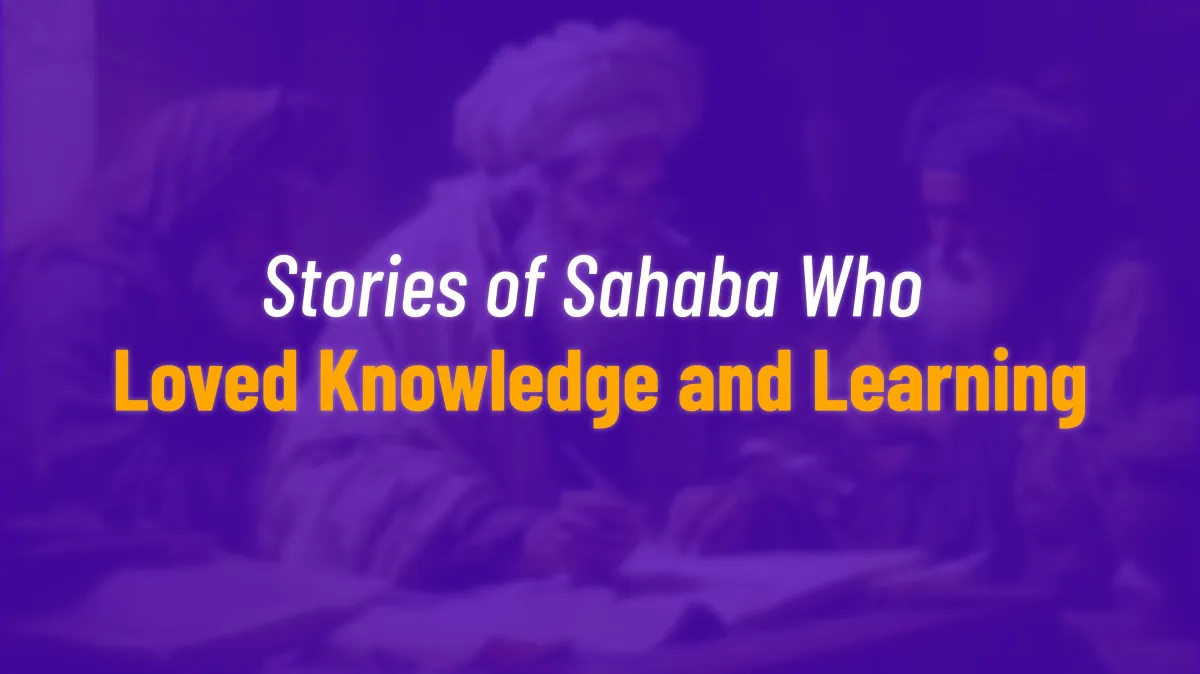
Stories of Sahaba Who Loved Knowledge and Learning
The companions of the Prophet Muhammad (peace be upon him), known as the Sahaba, were remarkable individuals who dedicated their lives to Islam. One of their most inspiring qualities was their deep love for knowledge and learning. The Sahaba and knowledge are closely linked, as their passion for understanding the Quran and the teachings of the Prophet (peace be upon him) laid the foundation for Islamic education and scholarship.
Why the Sahaba Loved Knowledge
The Sahaba’s love for knowledge stemmed from their faith and their desire to please Allah. They understood that knowledge was the key to strengthening their relationship with Allah and living according to His guidance. The Prophet Muhammad (peace be upon him) emphasized the value of knowledge by saying:
“Whoever treads a path seeking knowledge, Allah will make the path to Paradise easy for him.” (Sahih Muslim)
This encouragement motivated the Sahaba to seek knowledge tirelessly, whether through studying the Quran, learning hadith, or gaining practical wisdom for daily life.
Abdullah ibn Abbas: The Scholar of the Ummah
One of the most famous Sahaba who loved knowledge was Abdullah ibn Abbas (may Allah be pleased with him). He was a young cousin of the Prophet (peace be upon him) but became one of the greatest scholars in Islamic history. His dedication to learning was unmatched. He would often ask the elders among the Sahaba about the teachings of the Prophet (peace be upon him).
Abdullah ibn Abbas was known for his deep understanding of the Quran. The Prophet (peace be upon him) made dua for him, saying:
“O Allah, give him a deep understanding of the religion and teach him the interpretation of the Quran.” (Sahih Bukhari)
Through this blessing and his hard work, Abdullah ibn Abbas became a source of knowledge for the entire Muslim community.
Aisha bint Abu Bakr: A Teacher for Generations
Another shining example of the Sahaba and knowledge is Aisha bint Abu Bakr (may Allah be pleased with her), the wife of the Prophet Muhammad (peace be upon him). She was one of the most knowledgeable individuals of her time. Her wisdom and intellect made her a teacher for both men and women.
Aisha memorized countless hadiths and was well-versed in Islamic law, medicine, and poetry. She was a role model for seeking knowledge and sharing it with others. After the Prophet (peace be upon him) passed away, many companions would turn to her for guidance on religious matters.
Abu Hurairah: The Preserver of Hadith
Abu Hurairah (may Allah be pleased with him) is another example of a Sahabi devoted to knowledge. He spent just a few years with the Prophet (peace be upon him) but became the most prolific narrator of hadith. He said:
“People say that Abu Hurairah has narrated many hadiths, but my emigrant brothers were busy with their trade, and my Ansari brothers were busy with their property. I was a poor man and kept the company of Allah’s Messenger.” (Sahih Bukhari)
Abu Hurairah’s dedication to preserving and sharing the sayings of the Prophet (peace be upon him) ensured that future generations could benefit from this invaluable knowledge.
Salman Al-Farsi: The Seeker of Truth
Salman Al-Farsi (may Allah be pleased with him) is a unique example of a Sahabi who sought knowledge even before embracing Islam. His journey took him across different lands in search of the truth. When he finally met the Prophet Muhammad (peace be upon him), he embraced Islam and became one of the most devoted companions.
Salman’s story teaches us that the quest for knowledge requires patience, effort, and sincerity. His contributions, including his strategic advice during the Battle of the Trench, reflect the value of combining worldly knowledge with spiritual wisdom.
Why Do These Stories Matter Today?
The lives of the Sahaba show us the importance of learning and teaching. They inspire us to:
Seek Knowledge with Dedication: The Sahaba’s examples remind us to make learning a lifelong goal.
Share What We Learn: Knowledge becomes more valuable when we use it to benefit others.
Balance Religious and Worldly Knowledge: Like the Sahaba, we should strive to excel in both spiritual and practical knowledge.
The Prophet Muhammad (peace be upon him) said:
“The best of you are those who learn the Quran and teach it.” (Sahih Bukhari)
By following their example, we can improve ourselves and contribute to our communities.
Conclusion
The stories of the Sahaba and knowledge show us how much they valued learning and how it shaped their lives. Their dedication to understanding and sharing the teachings of Islam continues to inspire Muslims today. May we follow their footsteps and strive to seek knowledge that benefits us in this world and the Hereafter. Ameen.
